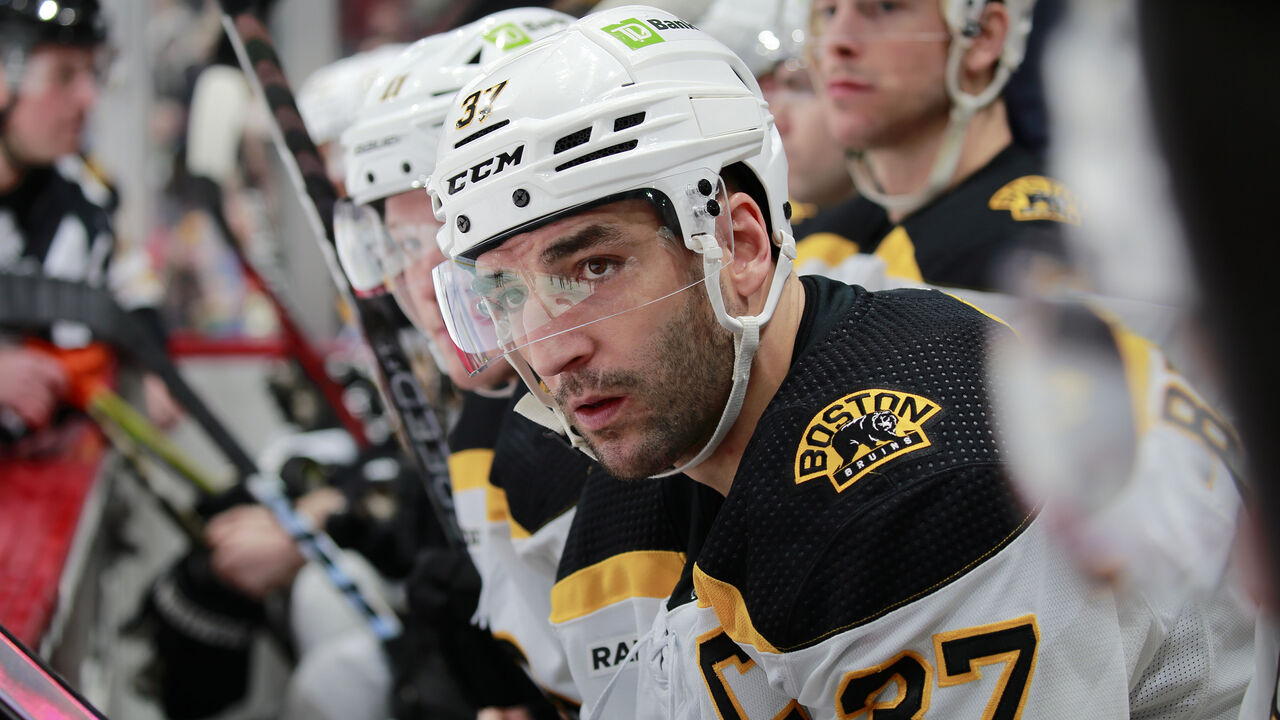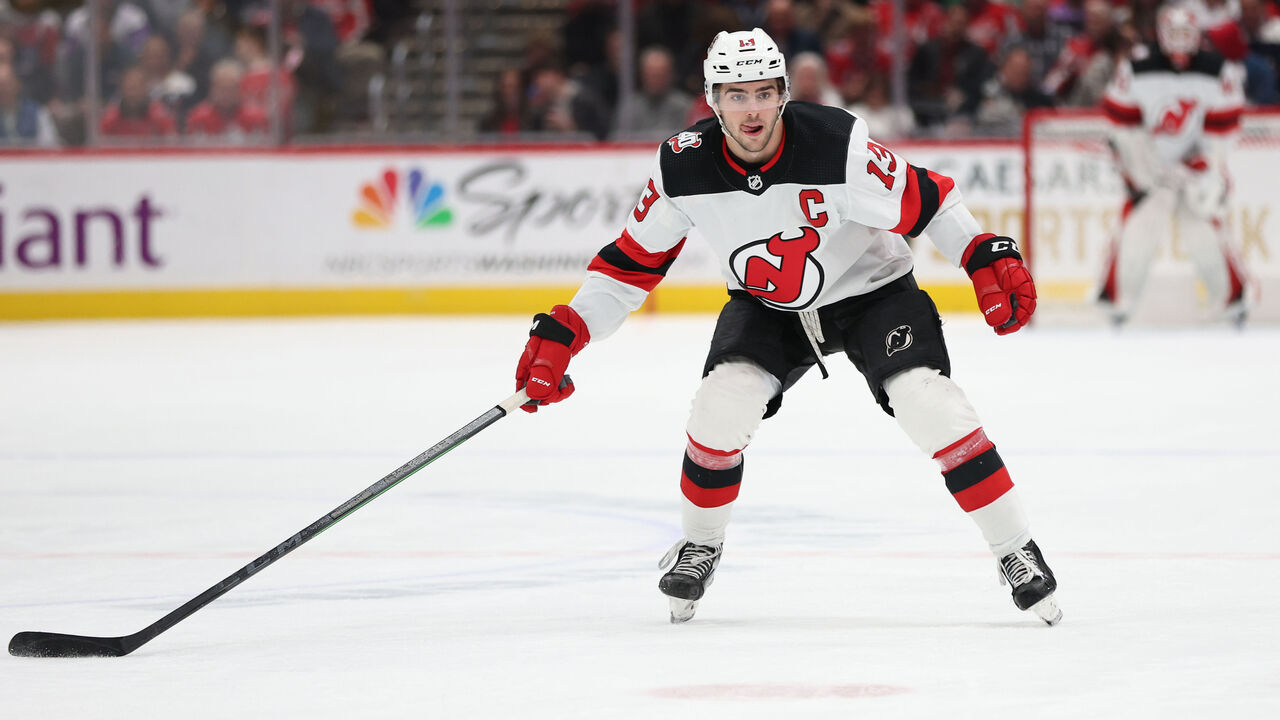Can Marner (or anybody else) pry the Selke Trophy away from Bergeron?
The next time you watch the Boston Bruins, fix your eyes on No. 37 and don't look away for the entire shift. Take a few mental notes. Then do the same thing when Patrice Bergeron hops over the boards again, and for a third time.
By the end of the third shift, you'll start to see the patterns of a hockey genius.
The Bruins captain will probably win a faceoff cleanly, and for the following 40 seconds, he'll stay within a few feet of the puck, never cheating for offense or defense. He won't be overbearing to teammates or suffocating to opponents; he'll just be nearby, lurking from the perfect spot. If Boston has the puck, he's a safety valve, and if the opposition has possession, he's a disruptive force.

As I discussed during the home stretch last season, Bergeron earns Selke Trophy votes through thousands of subtly smart plays. And the 2022-23 campaign, Bergeron's 19th in the NHL, has been no different. At 37, he remains a textbook 200-foot center and a front-runner for the award that honors "the forward who best excels in the defensive aspects of the game."
Bergeron's finished first, second, or third in voting in a staggering 11 straight seasons, claiming the trophy a record five times. He's arguably the greatest defensive forward ever, and until his play tapers off or he retires, the Selke is his to lose.
Yet voters don't blindly select Bergeron. It's a deep field this year, with Jordan Staal, Mikael Backlund, Joel Eriksson Ek, and Elias Pettersson among the dozen or so forwards vying for votes.
Using data from Sportlogiq and Evolving-Hockey, let's assess how three of them - Mitch Marner of the Toronto Maple Leafs, Aleksander Barkov of the Florida Panthers, and Nico Hischier of the New Jersey Devils - stack up against Bergeron. (All tracking statistics current through Monday's games.)
The Marner conversation

What's helping Marner's case: Marner leads the league in takeaways, with 97 in 73 games. Like a grandmaster chess player, he's elite at anticipating his opponent's next move. He takes efficient routes and won't be outhustled.
Marner, who's armed with remarkable hand-eye coordination, ranks second among everyday NHL forwards in blocked passes per game. He regularly knocks down clearing attempts and intercepts stretch passes before quickly turning the change of possession into a grade-A scoring chance for the Leafs.
Marner is both an offensive dynamo (28 goals and 66 assists for 94 points) and a workhorse (21:19 a night, including 2:20 on the penalty kill). He has Bergeron beat in both areas (57 points in 73 games; 17:36 and 1:46). And while the Selke is by definition reserved for defensive studs, there's logic in the old "the best defense is a good offense" argument. A strong two-way impact should be seen as a boon to - not a drag on - Marner's case.

What's hurting Marner's case: Centers have owned the Selke during the salary-cap era. In fact, 2002-03 was the last time a winger won (Jere Lehtinen). While it'd be nice to break the drought - Mark Stone has come close - the trend is grounded in reason: Wingers generally have it easier than centers on the defensive side of the puck. They don't help out as much deep in the zone or take faceoffs - two areas in which Bergeron absolutely crushes.
Bergeron's Bruins also boast the NHL's top penalty-killing percentage while the Leafs sit 14th. Quality of teammates is a major factor with a stat like PK%, and Boston has better personnel, but the 13-team gap is worth mentioning.
Meanwhile, Bergeron ranks second in goals against per 60 minutes among the 349 forwards who've logged 500 five-on-five minutes or more this season. His ludicrous rate of 1.31 trails only Stefan Noesen, a Carolina Hurricanes forward who's faced significantly weaker competition. Marner's tied with Jordan Staal for 90th, at 2.18 goals against per 60. Very good, but not Bergeron great.
The Barkov conversation

What's helping Barkov's case: For voters who fancy a pure defensive artist, Barkov would be a tantalizing candidate. Among everyday NHL forwards, he ranks first in puck-battle wins per game, second in stick checks per game, third in loose-puck recoveries per game, and fourth in blocked passes per game. What else could Panthers head coach Paul Maurice ask for?
Barkov, the 2020-21 Selke winner, plays a ton (21:15 overall, 2:04 shorthanded) and alongside less talented teammates than the others we're considering here. His two most common linemates at five-on-five this year have been Sam Reinhart and Carter Verhaeghe, while Gustav Forsling and Brandon Montour have been the defensemen who most often share the ice.
Bergeron's crew, by comparison, consists of Brad Marchand, Jake DeBrusk, Hampus Lindholm, and Charlie McAvoy. All but DeBrusk are star-caliber players.

What's hurting Barkov's case: Barkov's tracking stats are extremely impressive. But Bergeron ranks fairly high on various lists too - fifth in puck-battle wins, sixth in blocked passes, 16th in stick checks, and 49th in loose-puck recoveries. Barkov's edges in those categories aren't definitive.
Barkov's shot-based statistics - five-on-five shot attempts against, expected goals against, shots on goal against - grade out at 18th, 118th, and 134th out of 349 qualified forwards. While some of that is linked to Florida's middling five-on-five numbers, the low ranks still sour Barkov's Selke resume. Another thing: Barkov's appeared in only 60 games this year. Missing 14 games isn't cause for exclusion from the discussion, but it diminishes the body of work.
Lastly, a note on the quality of Barkov's opponents. Sportlogiq calculates a "strength of opposition" metric, which is the cumulative average of offense-generating plays by opposing forward lines. The higher the average, the more difficult the defensive assignment. Barkov, with a strength of opposition rating of 22.9, is 215th among everyday forwards. Bergeron, with a 24.5 rating, is fifth.
The Hischier conversation

What's helping Hischier's case: If Marner's the takeaway king and Barkov's the tracking-data wizard, Hischier's the do-everything, all-around guy. The Swiss center doesn't have a discernible weakness, posting good-to-excellent numbers in virtually every relevant defensive category, from expected goals against and faceoff win percentage to puck-battle wins and takeaways.
Penalty differential is an interesting separator, though. This season, Hischier's been assessed only four minor penalties but drawn 25 penalties for the league's third-best differential. This type of discipline isn't typically associated with strong defensive play or the Selke, but maybe it should be. Power plays are so lethal in the modern NHL that every man-advantage opportunity is valuable.
Something else that can't be discounted: Hischier is the defensive conscience of an upstart Devils team, leading the forward group in shorthanded ice time (New Jersey has the seventh-best PK%). In many ways, he's the yin to Jack Hughes' yang.

What's hurting Hischier's case: Awkwardly, what helps Hischier is also what hurts him. Bergeron is a do-everything, all-around guy like Hischier, except the Bruin gets better results. Take the faceoff circle: Hischier has won 53.6% of all draws, tying him for 30th in the league, and he's even better in the defensive zone, tying for ninth at 57.8%. Bergeron's 60.6% overall rate (third) and 61.3% D-zone rate (fifth) make Hischier's strong work appear, well, less stellar.
Hischier's versatility could certainly earn him a finalist nod. But, like Marner and Barkov, he cannot match the layers of Bergeron's dominance. Not only does Bergeron have a materially better goals against per 60 rate at five-on-five - a clear indicator of defensive prowess - but his strength of opposition is far higher than Hischier's (23.1 rating, 165th among everyday forwards).
Bergeron has been competing against the best of the best every shift this season, and still, his results are undeniably Selke-worthy. Even at 37, the man is essentially peerless.
John Matisz is theScore's senior NHL writer. Follow John on Twitter (@MatiszJohn) or contact him via email ([email protected]).
HEADLINES
- 2026 World Junior Hockey Championship predictions: Podium, MVP, more
- 1 prospect from each NHL team to watch at 2026 world juniors
- McDavid, Draisaitl power surging Oilers past Flames
- Nylander's 4 points lift Maple Leafs over Penguins to snap 3-game skid
- Report: Leafs not contemplating firing Berube, Treliving